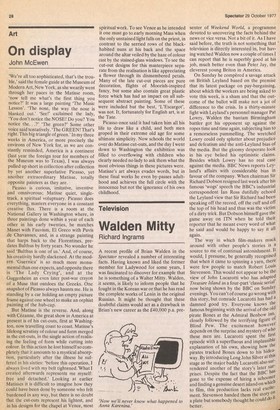Television
Walden Mitty
Richard Ingrams
A recent profile of Brian Walden in the Spectator revealed a number of interesting facts. Having known and liked the former member for Ladywood for some years, I was fascinated to discover for example that he is something of a Walter Mitty. Walden, it seems, is likely to inform people that he fought in the Korean war or that he has read the complete works of Lenin in the original Russian. It might be thought that these doubtful claims would act as a drawback in Brian's new career as the £40,000 p.a. pre senter of Weekend World, a programme devoted to uncovering the facts behind the news or vice versa. Not a bit of it. As I have said before, the truth is not something that television is directly interested in, but having watched Walden now a couple of times! can report that he is superbly good at his job, much better even than Peter Jay, the cleverest young Briton in America.
On Sunday he compered a savage attack on British Leyland based on the premise that its latest package on pay-bargaining, about which the workers are being asked to vote this week, is a sham and that the outcome of the ballot will make not a jot of difference to the crisis. In a thirty-minute fight with Leyland's personnel manager Pat Lowry, Walden the bantam Birmingham battler got his opponent up against the ropes time and time again, subjecting him to a remorseless pummelling. The wretched Lowry could only splutter about prejudice and defeatism and the anti-Leyland bias of the media, But the gloomy desperate look in his eye belied his optimistic claims. Besides which Lowry has no real case against the media. BBC News reports Leyland's affairs with considerable bias in favour of the company. When chairman Sir Richard Dobson resigned last week after his famous 'wogs' speech the BBC's industrial correspondent Ian Ross dutifully echoed the Leyland view that Sir Richard had been speaking off the record, off the cuff and off the top of his head and thus was the victim of a dirty trick. But Dobson himself gave the game away on ITN when he told their reporter that he meant every word of what he said and would be happy to say it all again. The way in which film-makers muck around with other people's stories is a source to me of continual astonishment. It would, I presume, be generally recognised that when it came to spinning a yarn, there were few people to match Robert Louis Stevenson. This would not appear to be the view of John Lucarotti who has adapted, Treasure Island as a four-part 'classic serial now being shown by the BBC on SunClaY evenings. You can't of course go wrong with this story, but comrade Lucarotti has had a damned good try. Everyone knows the famous beginning with the arrival of the old pirate Bones at the Admiral Benbow closely followed by the terrifying figure or Blind Pew. The excitement however depends on the surprise and mystery of wile these men are. Lucarotti spent the first episode with a superfluous and implausible explanation of his own, showing how the pirates tracked Bones down to his hideaway. By introducing Long John Silver at this stage as the major baddy Lucarotti also surrendered another of the story's later surprises, Despite the fact that the BBC has gone to the expense of hiring a scho0n.e! and finding a genuine desert island on wh.icn to film, this production lacks real excitement. Stevenson handed them the story 0,11 a plate but somebody thought he could do it better.


































 Previous page
Previous page